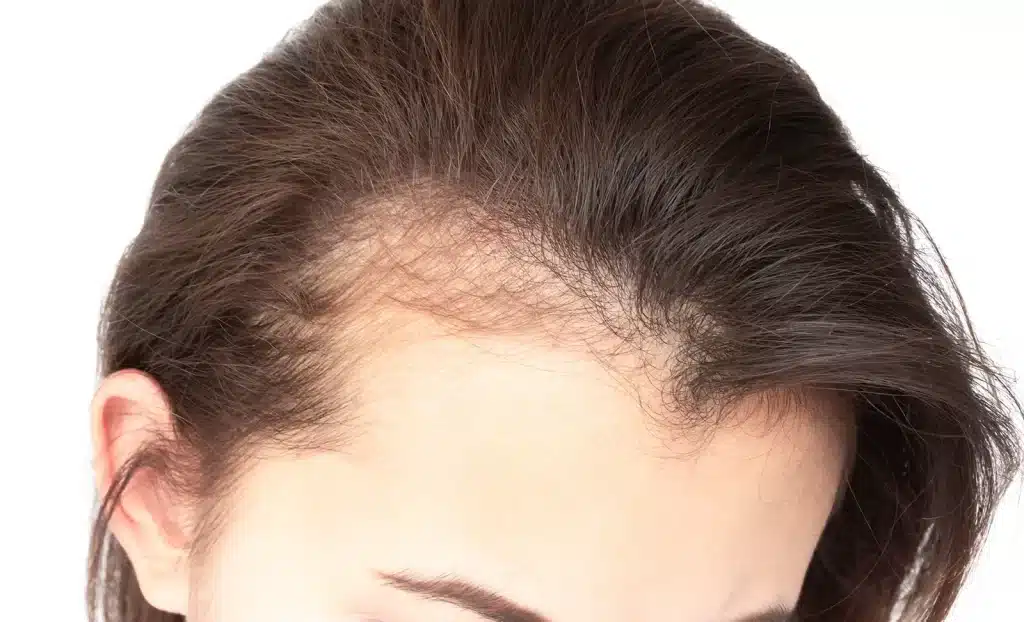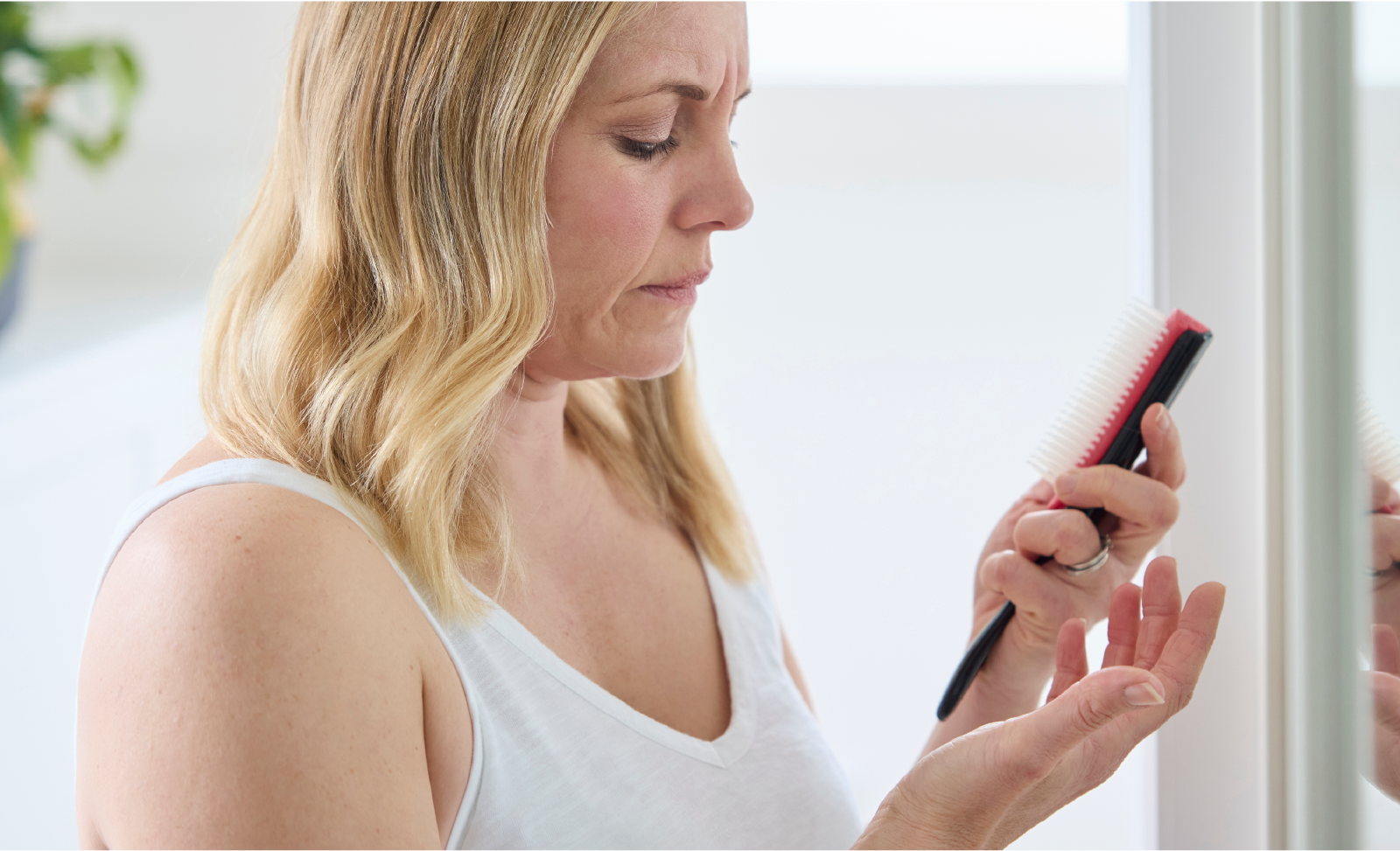Have you experienced hair loss as a woman? If so, you may wonder what is the cause, as there is more than a few type of hair loss and causes. Hair loss in women is very common, with around 40% of women experiencing noticeable hair loss by the time they reach 50. Even with how common it is, it can be emotionally difficult to deal with, as hair is an intrinsic part of many women’s identities.
To help you understand what may be causing your hair loss, and hopefully find a solution, here are the most common conditions and illnesses that cause hair loss in females.
Thyroid Disease
Your thyroid is a gland that sits in the front of your neck and is responsible for releasing hormones. Thyroid disease is when the thyroid is unable to regulate hormones as it should, which can cause a myriad of symptoms. The two most common types of thyroid diseases are hypothyroidism (an underactive thyroid) and hyperthyroidism (an overactive thyroid). Both of these can cause hair loss when left untreated, typically causing thinning hair all over rather than bald patches. Fortunately, the hair loss can be reversed when the disease is treated – often with medications.
Lupus
Lupus is an autoimmune disease that causes the body’s immune system to attack the body, which means it affects many organs, including the brain, kidneys, heart, and lungs. Lupus brings with it many symptoms like fatigue, rashes, swelling, fever, and – yes – hair loss. The reason it causes hair loss is due to the inflammation and damage to the skin, which can affect the hair follicle’s ability to grow healthy hair. Plus, some of the medications used to treat lupus can even exacerbate hair loss.
PCOS
PCOS is a condition that causes hormonal imbalances and affects women who are of reproductive age. It specifically targets the ovaries, causing them to become enlarged, which then causes a higher-than-normal level of male hormones. Common symptoms include
Anaemia
Anaemia occurs when there is not enough haemoglobin (red blood cells) in the blood, and is particularly common in women, affecting around 8% of women compared to 3% of men. [2] Anaemia is typically caused by an iron deficiency, which means it’s often women who are pregnant or experience very heavy periods that end up with this condition. Symptoms include drowsiness, tiredness, dizziness, and shortness of breath. On top of that, anaemia can cause hair loss due to the body being unable to send enough oxygen to the hair follicles. However, once treated, the hair can grow back, so it’s not permanent hair loss.
Telogen Effluvium
Telogen effluvium is a type of hair loss caused by shock or stress to the body, which means it can occur after losing weight, taking a new medication, becoming pregnant, or going through a period of extreme emotional stress. What happens is the hair stays in the telogen (or resting) phase for too long, so the hairs do not get replaced. It causes the hair to fall out all over the scalp. Usually, telogen effluvium is only temporary.
Alopecia Areata
Alopecia areata is an autoimmune disease that specifically targets hair follicles, causing hair to fall out over the body. The symptoms include round bald spots on the scalp and eyebrows. Unfortunately, there is no cure for alopecia areata, but some medications like minoxidil and steroid injections can work well.
Androgenetic Alopecia
Androgenetic alopecia is typically known as either male pattern baldness or female pattern baldness – in this case, we are referring to the female version. It’s the most common cause of alopecia in women, causing symptoms like hair thinning and a receding hairline. It’s not dangerous and is typically a normal part of ageing. It’s also genetic. Regarding treatment, the most effective solutions involve minoxidil and/or a hair transplant.
Pregnancy and Postpartum
Your body goes through many changes during pregnancy and after giving birth, and many women experience hair loss during this time. It’s more common during the postpartum period, but it can also happen during pregnancy. The reason for this is the hormonal imbalances that occur during this time – in particular, estrogen levels typically drop quite rapidly, which can lead to the hair falling out in clumps. The good news is that postpartum hair loss is temporary and you can expect full hair regrowth after several months.
Scalp Psoriasis
Scalp psoriasis is a chronic autoimmune disease that targets the skin, resulting in symptoms such as redness, itchiness, flaking, and plaques on the scalp. All these symptoms can damage the hair follicles, leading to hair loss. There is not yet a cure for scalp psoriasis, but medications can help patients manage their symptoms and, in turn, help the hair grow back.
Menopause
Menopause occurs when a woman is no longer in her reproductive years. It tends to occur between the ages of 45 to 55, but it can happen earlier or later than that (although rarely much later). There are many symptoms associated with menopause, including mood swings, difficulty sleeping, hot flashes, and joint pain. Another symptom of menopause is hair loss, which is caused by the hormonal imbalances that occur during this time when the estrogen levels decrease.
Dietary Deficiencies
Certain deficiencies can cause hair loss in women (and men). If you have a shortage of vitamin A, vitamin D, iron, protein, or calcium, there’s a chance that it will cause hair thinning. Suddenly losing weight can also impact your hair growth, causing telogen effluvium, which we discussed earlier.
Eating Disorders
Eating disorders, such as anorexia nervosa and bulimia nervosa, often lead to a person not getting enough nutrients or losing weight very quickly. This can lead to hair loss in two ways – first, if a person does not get the nutrients they need, that could lead to deficiency-caused hair loss. On top of that, sudden weight loss (especially losing more than fifteen pounds very quickly) can cause telogen effluvium.
Trichotillomania
Trichotillomania is a medical condition that causes people to pluck out their own hair due to stress and primarily affects women, although some men also have it. [3] As the illness literally causes the person to pull out hair, it naturally leads to hair loss – the more severe the trichotillomania, the more hair loss there will be. Typically, trichotillomania coincides with other mental health conditions such as anxiety and OCD.
Do You Think You Have One of These Conditions?
If you are experiencing hair loss and believe it’s due to one of these illnesses that cause hair loss in females, it’s crucial you see a doctor as soon as possible. The sooner you get diagnosed, the sooner the ball can get rolling regarding treatment and hopefully recovery, which could include a hair loss treatment. Not to mention, some of these conditions can be serious and cause more dangerous symptoms than hair loss.
Are You Unsure What is Causing Your Hair Loss?
If you are unsure what is causing your hair loss and are not sure whether it’s one of these illnesses that cause hair loss in females, it’s still important to see your doctor. While some conditions like androgenetic alopecia are not dangerous and are pretty typical as women get older, you should still get to the root cause, as it might be treatable.
Solutions for Female Hair Loss
If you have one of the illnesses that cause hair loss in females, the best solution is to treat it at its root. For example, if you have lupus, treating the lupus should allow your hair to grow back. However, there are also some other hair loss solutions that can help:
Minoxidil
Minoxidil is a hair loss medication that both men and women can take (unlike finasteride and dutasteride, which are male-only). It’s a solution that you apply topically to your scalp, and it works by stimulating blood flow, which in turn increases hair growth.
Low-Level Laser Therapy
Another solution that can stimulate the hair follicles is low-level laser therapy. This treatment is minimally invasive – there are no injections or surgery involved. In fact, you can even get a device that lets you perform it at home.
Hair Transplant
Hair transplants are minimally invasive surgical procedures that take hair follicles from one section of the scalp and then graft them to another area – specifically, the place where the patient experiences hair loss. While hair transplants are most common for men experiencing androgenetic alopecia, the procedure can also work very well for women. It’s a permanent solution that allows you to grow a full head of hair. If you want to see what a hair transplant can do for women, go to our patients gallery.
What Illnesses Cause Hair Loss in Females? In Summary
As you can see, there are many illnesses that cause hair loss in females, ranging from types of alopecia to autoimmune conditions to natural occurrences like menopause. With so many potential causes, it can be tricky to understand what’s causing your hair loss, which is why speaking to a medical professional is so important.
Are you interested in a final solution for your hair loss? If you want to enjoy a full head of hair again, get in touch with our team today. Our hair track app will put you in touch with the best hair transplant surgeons in the business.
Sources:
- https://www.uclahealth.org/news/article/what-causes-female-hair-loss#:~:text=By%20age%2050%2C%20up%20to,their%20ponytail%20is%20suddenly%20thinner.
- https://cks.nice.org.uk/topics/anaemia-iron-deficiency/background-information/prevalence/#:~:text=In%20the%20UK%2C%20it%20is,women%20have%20iron%20deficiency%20anaemia.
- https://www.mayoclinic.org/diseases-conditions/trichotillomania/symptoms-causes/syc-20355188#:~:text=Although%20far%20more%20women%20than,often%20in%20boys%20and%20girls.






